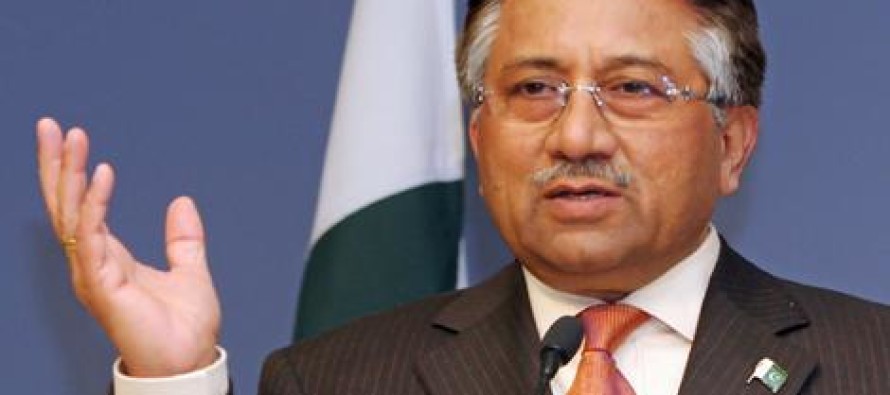Former President General Pervez Musharraf faces criminal prosecution

It is marvellous what a difference a couple of years makes in politics. General Musharraf was an undisputed leader of Pakistan for almost eight years and now he may face criminal prosecution in his own country. If convicted Musharraf faces up to three years in prison.
He lives in London and dares to return to Pakistan. This is indeed a lesson for military rulers who unconstitutionally usurp power on the pretext of “national interest”.
Police registered on 11th August a case in Islamabad against former President and his unnamed collaborators on charges of detaining judges of superior courts and their families in their houses after the proclamation of emergency on Nov 3, 2007.
The Police registered the case after 18 hours of reported discussion with senior police officers and officials of the interior ministry.
The case was registered in accordance with an order issued by the district additional and sessions judge on 10th August after four months of hearing of petitions submitted by Advocate Chaudhry Aslam Ghuman.
General Musharraf dismissed the Chief Justice of Pakistan, Justice Iftikhar Mohammad Chaudhry and 60 other judges of superior and higher courts, and illegally and immorally detained the judges and their families for five and a half months, stopping them from performing their judicial duty and their children from appearing in examination.
In the FIR, the former President and his collaborators had been charged under sections PPC 344 and 34 which deal with wrongful confinement for 10 or more days and acts done by several persons in furtherance of common intention.
The complainant accuses the former president of proclaiming illegal and immoral Provisional Constitutional Order (PCO), sacking the Chief Justice and dozens of judges.
The FIR said the acts damaged the country’s judicial system, caused mental torture to lawyers’ community and citizens and also brought bad name for Pakistan throughout the world.
Commenting on the text and charges in the FIR, police and legal experts said the police had booked the accused (the former president and his collaborates) only for detaining the judges in illegal confinement.
They said that police officials, intelligence agencies, city administration and the interior ministry had been included in the category of collaborators for keeping the judges in illegal confinement.
They said the investigating officer of the secretariat police would visit the area where the judges had been detained and record statements of the judges, their family members and servants, officials deployed in and around the house and the judicial colony.
They said the case had not been registered by affected people—judges and their family members—who had been detained in their houses which might cause complications.
Police said that only seven judges had been detained in Islamabad’s judicial colony and the others in different parts of the city, including Karachi, Quetta, Lahore and Peshawar.
Similar cases should be registered in the cities where the judges had been detained because the places were out of the jurisdiction of capital police which would investigate the matter.
The Police say that if the former President returns to the country (he is now in London) he could be detained for ordering the arrest of judges while he was in power.
However, Mohammed Ali Saif, an attorney for General. Musharraf, said the former President cannot be arrested or prosecuted on such charges. “The case does not have any legal basis,” he told a Pakistani television channel. Efforts to reach Gen. Musharraf, 66 years old, were unsuccessful.
General Pervez Musharraf ‘s aligned party lost a 2008 election and under the threat of impeachment, Gen.. Musharraf stepped down on 18th August 2008 and was replaced by Asif Ali Zardari, the widower of slain former Prime Minister Benazir Bhutto, as the country’s president. The sacked judges were restored to their positions.
Pakistan’s Supreme Court in a landmark ruling last month declared unconstitutional Gen. Musharraf’s decision to impose emergency rule and all the presidential decisions taken during that period including invalidating the appointments of judges he made during that period. Gen. Musharraf had been asked to appear before the court to defend his actions but declined to appear.
The court decision was eagerly awaited by many Pakistanis, especially lawyers who led a movement that helped push Gen. Musharraf from office. Many gathered across the country, dancing in the streets and cheering when the verdict was announced.
“Today we have to a great extent achieved our goal, that is independence of judiciary,” Hamid Khan, one of the petitioners who brought the case to court, told The Associated Press. “The purpose of this whole exercise is to block military dictators’ intervention in future which we have been seeing again and again in past.”
Prime Minister Yousuf Raza Gilani welcomed the decision, describing as a good omen for the future of democracy in Pakistan, which has been run by the army for about half of its nearly 62-year existence.
Farahnaz Ispahani, a spokeswoman for President Asif Ali Zardari, also hailed the decision, describing it as “the last nail in the coffin of dictatorship.”
If the court order and the criminal complaint mean that Gen. Musharraf is forced to live abroad, it would fit the pattern of Pakistan’s treatment of its former premiers: Both Ms. Bhutto and Nawaz Sharif, another former prime minister, spent years in effective exile before being allowed to return to the country.
The democracy is always better than the military rule since it is not an imposed government on the people. In democracy people have there own ruler as they select it. The military regimes as have been seen in past have been counter-productive. Although there are some demerits of democracy but the solution does not rest in military rule. As Winton Churchill said : “ It has been said that democracy is the worst form of government except all those other forms that have been tried from time to time.”
By Barrister Harun ur Rashid
Former Bangladesh Ambassador to the UN, Geneva.


